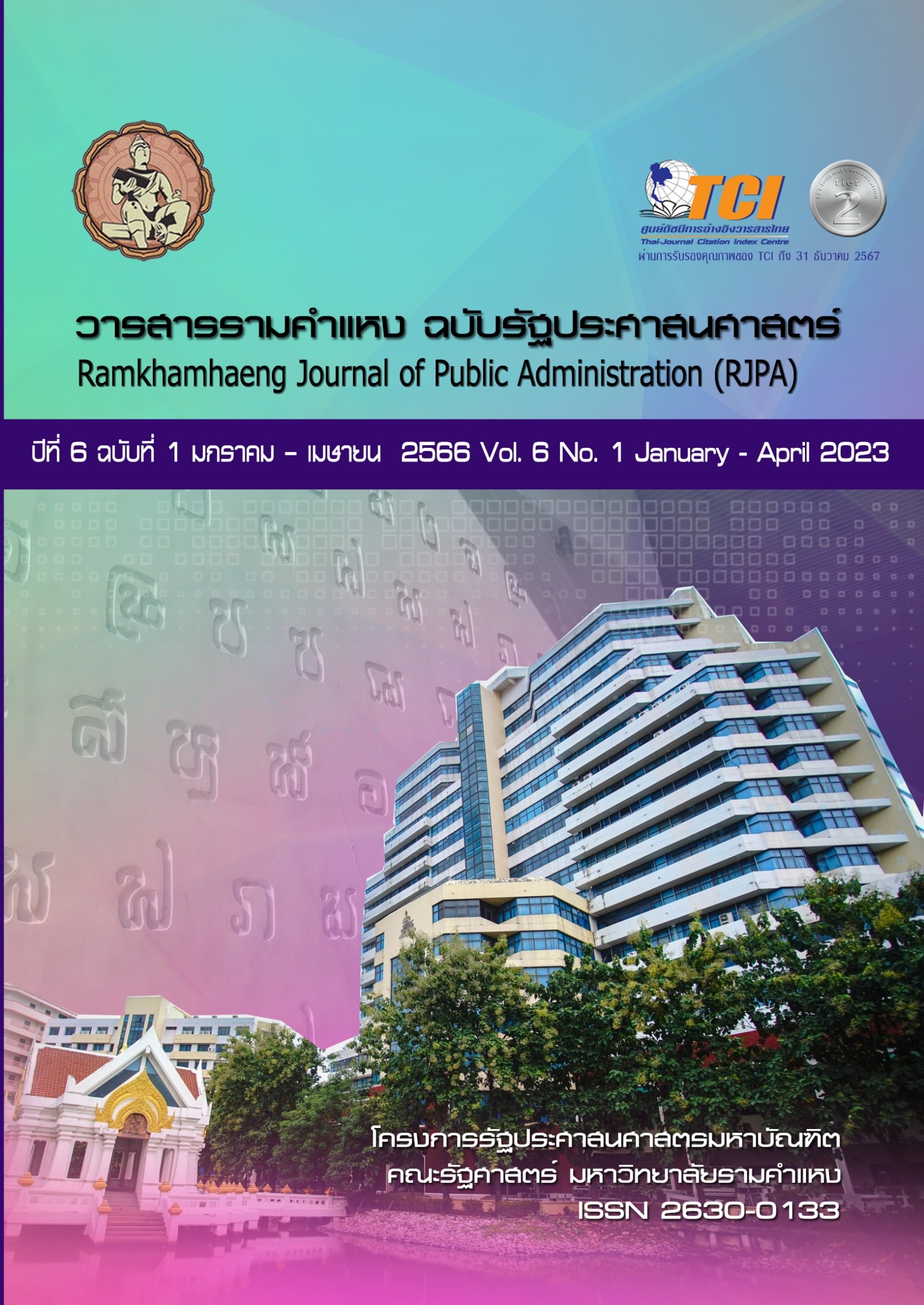Political economy of sacred objects in the Southern region, B.E. 2557-2564
Keywords:
political economy, sacred Item, the Southern regionAbstract
The objectives of this research are to investigate the origin of beliefs, history, and traditions concerned with sacred objects and to examine the effects of sacred objects in the southern region in the aspects of economy, society, and political culture. The researcher uses the techniques of documentary research, interviews, and participatory observation. The subjects studied consisted of persons selling amulets (Buddha images stalls), members of the general public paying respect to sacred objects in the southern region, politicians, and local politicians.
Findings show that people in the southern region with problems in the mind depend on sacred objects to make merit and ask for blessings, change one’s bad fortune through a ceremony, and others. This results in cash flow in the economic system. Other businesses also arise such as the creation of sacred objects; amulet magazines; tourism; hotels and accommodations. This also creates income distribution, raises the level of livelihood and lifeways of the community, as well as accommodates economic expansion, logistics, and tourism.
References
กระทรวงพาณิชย์, สำนักงานนโยบายและยุทธศาสตร์การค้า. (2563). แผนปฏิบัติราชการปี 2564 ของสำนักงานนโยบายและยุทธศาสตร์การค้า. ค้นเมื่อ 15 มกราคม 2564, จาก http://www.tpso .moc.go.th/th/node/10866
คมชัดลึกออนไลน์. (2557). ประยุทธ์-เหล่าทัพ ‘แถลง’ ควบคุมอำนาจรัฐ. ค้นเมื่อ 15 มกราคม 2564, จากhttps://www.komchadluek.net/news/185160
ชไมพร เจริญครบุรี. (2559). กระบวนการสร้างความหมายใหม่บนประสบการณ์เดิมของบุคคลต้นแบบในสังคมไทย. ดุษฎีนิพนธ์พุทธศาสตรดุษฎีบัณฑิต, มหาวิทยาลัยมหาจุฬาลงกรณราชวิทยาลัย.
ธนภณ พันธเสน. (2550). อิทธิพลของจิตวิวัฒน์ที่มีต่อการเปลี่ยนแปลงสู่การพัฒนาอสังหาริมทรัพย์แบบยั่งยืน. วารสารวิจัยและสาระสถาปัตยกรรม/การผังเมือง, 5(2), 115-131.
นิรันดร์ จงวุฒิเวศย์. (2534). ทฤษฎีและแนวความคิดเกี่ยวกับการพัฒนาชนบท. ในเอกสารการสอน ชุดวิชาคหกรรมศาสตร์กับการพัฒนาชุมชน (หน่วยที่ 1, หน้า 1-47). นนทบุรี: สำนักพิมพ์มหาวิทยาลัยสุโขทัยธรรมาธิราช.
พระไพศาล วิสาโล. (2548). จิตผลิบาน. กรุงเทพมหานคร: สำนักพิมพ์สายธุรกิจ.
วรนันท์ ลิมปสถิรกิจ. (2553). ความเชื่อที่ถูกทำให้เป็นสินค้า: ศึกษากรณีเบี้ยแก้วัดกลาง-บางแก้ว อำเภอนครชัยศรี จังหวัดนครปฐม. วิทยานิพนธ์สังคมวิทยามหาบัณฑิต, จุฬาลงกรณ์มหาวิทยาลัย.
วิรัช เตียงหงษากุล. (2529). การพัฒนาชุมชนตามแนวความคิดนักปรัชญาตะวันตก. กรุงเทพมหานคร: สำนักพิมพ์โอเดียนสโตร์.
สถาบันการศึกษาสัตยาไส. (2543). เด็กกับสติปัญญาทางศีลธรรม ทางรอดของมนุษย์. กรุงเทพมหานคร: ผู้แต่ง.
สนธยา พลศรี. (2547). ทฤษฎีและหลักการพัฒนาชุมชน (พิมพ์ครั้งที่ 5). กรุงเทพมหานคร: สำนักพิมพ์โอเดียนสโตร์.
สุภางค์ จันทวานิช. (2554). ทฤษฎีสังคมวิทยา. กรุงเทพมหานคร: สำนักพิมพ์แห่งจุฬาลงกรณ์มหาวิทยาลัย.
Baker, D. (2006). The political economy of fascism: Myth or reality, or myth and reality?. New Political Economy, 11(2), 227-250.
Fowler, J. (1987). Organizations climate: A review of theory and research. Psychological Bulletin, 81, 1096-1112.
Gruble, A. (1988). The free economy and strong state. Durham, NC: Duke University Press.
Hay, C. (1999). The political economy of new labour. Manchester, England: Manchester University Press.
Mayer, C. S. (1988). In search of stability: Explorations in historical political economy. Cambridge, England: Cambridge University Press.
Monotheism. (2012). Encyclopædia Britannica. Retrieved 12 January, 2021, from http://www.britannica.com/EBchecked/topic
/390101/monotheism
Wilber, K. (2001). Eye to eye: The quest for the new paradigm (3th ed.). Boston: Shambhala.
สัมภาษณ์ส่วนบุคคล
กิติศักดิ์ พ้นภัย. การสัมภาษณ์ส่วนบุคคล, 30 ธันวาคม 2564.
ชวัลวิทย์ เชื้อทอง. การสัมภาษณ์ส่วนบุคคล, 15 ธันวาคม 2564.
ชิษณุพงศ์ โพธ์งาม. การสัมภาษณ์ส่วนบุคคล, 10 ธันวาคม 2564.
ธิติรัตน์ เหล่าคมพฤฒาจารย์. การสัมภาษณ์ส่วนบุคคล, 1 ธันวาคม 2564.
อนันต์ รัศมี. การสัมภาษณ์ส่วนบุคคล, 30 ธันวาคม 2564.
Downloads
Published
How to Cite
Issue
Section
Categories
License
Copyright (c) 2025 ปัญญา อุดมประสงค์สุข

This work is licensed under a Creative Commons Attribution-NonCommercial-NoDerivatives 4.0 International License.



